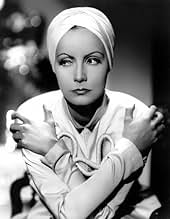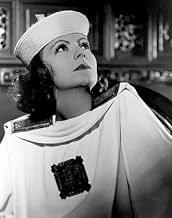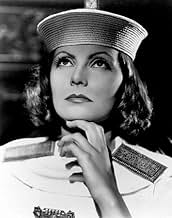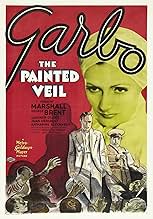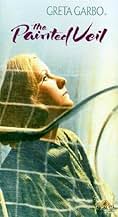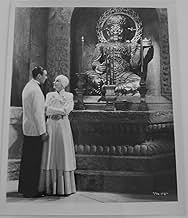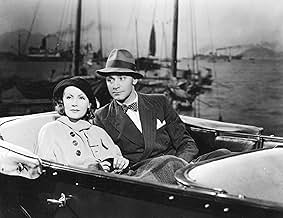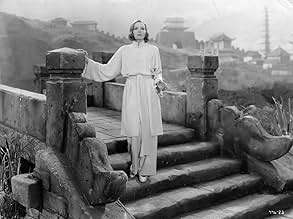VALUTAZIONE IMDb
6,5/10
1823
LA TUA VALUTAZIONE
Aggiungi una trama nella tua linguaA wife neglected by her husband, a medical researcher in China, falls in love with a dashing diplomatic attaché.A wife neglected by her husband, a medical researcher in China, falls in love with a dashing diplomatic attaché.A wife neglected by her husband, a medical researcher in China, falls in love with a dashing diplomatic attaché.
- Regia
- Sceneggiatura
- Star
- Premi
- 2 vittorie totali
Robert Adair
- Polo Player
- (scene tagliate)
Mariska Aldrich
- German Teacher
- (scene tagliate)
Maidena Armstrong
- German
- (scene tagliate)
Billy Bevan
- Bridegroom
- (scene tagliate)
Beulah Bondi
- Frau Koerber
- (scene tagliate)
W.H. Davis
- German
- (scene tagliate)
Vernon Dent
- Chief of Police
- (scene tagliate)
Recensioni in evidenza
This movie is imperfect, but I love it anyway.
Its imperfections:
The soundstage China of 1933's "Bitter Tea of General Yen" leaves the soundstage China of 1934's "Painted Veil" in the dust. "Yen's" China draws you in and intoxicates you. "Painted Veil's" China is fun, but it's a bit silly and superficial. A San Francisco Chinatown Chinese New Year's parade would be more profound.
George Brent is at his worst here. I've never seen him do anything quite like what he does here -- a fly-by-night and exploitative romancer who toys with women's hearts.
Brent wasn't great looking, but he was very good at playing the grounded, reliable foil to electric characters like Bette Davis' Judith Traherne in "Dark Victory."
Here, as Townsend, while speaking serious words, Brent adopts a silly smile, and -- literally -- renounces everything he says in the very next sentence. Maybe a much better looking, or more conventionally handsome, actor could have made this character charming in a snake-like, dangerous way (Erroll Flynn?) but Brent didn't really have the equipment to make Townsend as charming to the audience as he might have been to a neglected wife in China.
Garbo plays a near spinster who watches her younger sister marry, and, on the rebound, marries a man she doesn't love out of desperation.
How on earth could anyone make sense of *Garbo* as a desperate spinster? The movie doesn't even try to make sense of that. It just asks us to believe it. The viewer has to try to make up reasons for her spinster status. (Her parents kept her locked in a closet the first thirty or so years of her life? She had a horrible facial deformaty that suddenly fell off?)
BUT!
I still love this movie.
I love it for the moment when Herbert Marshall says, with the kind of real passion you expect of a contemporary production of a Eugene O'Neill play, that he despises himself for loving Garbo, after she has cuckolded him.
It's great to see Marshall, who so often played helpless men ill used by women ("The Letter," "Duel in the Sun," "The Little Foxes"), here finally able to effectively express his bitterness at being so ill used, and take some action in response, even if that action is intended to be fatal.
I love it for the complications that arise in the final portion. Hearts are changed. Suffering and human sacrifice changes them. Love is born of the kind of big events that sometimes do change people, and life stories, in real life.
This ending, though not in compliance with Maughm's novel, didn't strike me as a "Hollywood" "happy" ending at all. It struck me as a profound ending. It reminded me of a more recent film, Bertolucci's "Besieged," that also talks about the role of altruism in love and eroticism.
For those features, I deeply value this movie, in spite of its superficial imperfections.
Its imperfections:
The soundstage China of 1933's "Bitter Tea of General Yen" leaves the soundstage China of 1934's "Painted Veil" in the dust. "Yen's" China draws you in and intoxicates you. "Painted Veil's" China is fun, but it's a bit silly and superficial. A San Francisco Chinatown Chinese New Year's parade would be more profound.
George Brent is at his worst here. I've never seen him do anything quite like what he does here -- a fly-by-night and exploitative romancer who toys with women's hearts.
Brent wasn't great looking, but he was very good at playing the grounded, reliable foil to electric characters like Bette Davis' Judith Traherne in "Dark Victory."
Here, as Townsend, while speaking serious words, Brent adopts a silly smile, and -- literally -- renounces everything he says in the very next sentence. Maybe a much better looking, or more conventionally handsome, actor could have made this character charming in a snake-like, dangerous way (Erroll Flynn?) but Brent didn't really have the equipment to make Townsend as charming to the audience as he might have been to a neglected wife in China.
Garbo plays a near spinster who watches her younger sister marry, and, on the rebound, marries a man she doesn't love out of desperation.
How on earth could anyone make sense of *Garbo* as a desperate spinster? The movie doesn't even try to make sense of that. It just asks us to believe it. The viewer has to try to make up reasons for her spinster status. (Her parents kept her locked in a closet the first thirty or so years of her life? She had a horrible facial deformaty that suddenly fell off?)
BUT!
I still love this movie.
I love it for the moment when Herbert Marshall says, with the kind of real passion you expect of a contemporary production of a Eugene O'Neill play, that he despises himself for loving Garbo, after she has cuckolded him.
It's great to see Marshall, who so often played helpless men ill used by women ("The Letter," "Duel in the Sun," "The Little Foxes"), here finally able to effectively express his bitterness at being so ill used, and take some action in response, even if that action is intended to be fatal.
I love it for the complications that arise in the final portion. Hearts are changed. Suffering and human sacrifice changes them. Love is born of the kind of big events that sometimes do change people, and life stories, in real life.
This ending, though not in compliance with Maughm's novel, didn't strike me as a "Hollywood" "happy" ending at all. It struck me as a profound ending. It reminded me of a more recent film, Bertolucci's "Besieged," that also talks about the role of altruism in love and eroticism.
For those features, I deeply value this movie, in spite of its superficial imperfections.
The future looked a little uncertain for Greta Garbo in 1934. Under pressure from the rampant, crackpot Catholic League of Decency whose members were boycotting movie theatres and declaring 'purify or destroy Hollywood', the usually malleable Joseph Breen was obliged to make even stricter the Production Code. 'Mata Hari' was cut and 'Queen Christina' taken out of circulation whilst this adaptation of Somerset Maugham's 'The Painted Veil' needed to tone down its so-called sexual content and instead reflect moral values.
These factors alone cannot entirely explain why this film disappoints. Garbo's scenes with Herbert Marshall are excellent and there is a chemistry between her and George Brent owing to their relationship at the time being more than just professional. It just lacks that 'alchemy' by which everything comes together and falls below director Richard Boleslawski's usual high standards.
Garbo need not have worried as David 0. Selznick was soon to come to her aid. Whatever its flaws and despite being the least faithful to Maugham's original it remains, for this viewer at any rate, the most entertaining of the three versions. 'The Seventh Sin' of Ronald Neame and an uncredited Vincente Minnelli is rather lacklustre whilst it is probably kinder to draw a discreet veil over the most recent version directed by someone named John Curran.
These factors alone cannot entirely explain why this film disappoints. Garbo's scenes with Herbert Marshall are excellent and there is a chemistry between her and George Brent owing to their relationship at the time being more than just professional. It just lacks that 'alchemy' by which everything comes together and falls below director Richard Boleslawski's usual high standards.
Garbo need not have worried as David 0. Selznick was soon to come to her aid. Whatever its flaws and despite being the least faithful to Maugham's original it remains, for this viewer at any rate, the most entertaining of the three versions. 'The Seventh Sin' of Ronald Neame and an uncredited Vincente Minnelli is rather lacklustre whilst it is probably kinder to draw a discreet veil over the most recent version directed by someone named John Curran.
This film has some rather fantastic elements about it, mainly that Greta Garbo would be playing a spinster, and that having several suitors - as her mother claims that she has - she would hastily accept a marriage proposal from someone for whom she has absolutely no passion. In this case it is Herbert Marshall playing both an unloved husband and a devoted medical researcher into the cause and prevention of cholera. The other fantastic element is trying to believe that there is any chemistry between Garbo and "the other man, George Brent. Brent - who was so wonderful with Kay Francis, Bette Davis, and Ruth Chatterton - is here no more attractive than the husband he is trying to supplant. He has all the chemistry of a cardboard box.
The best part of the film is once Marshall realizes he has been cuckolded and makes an ultimatum to his faithless wife. He has just learned of a raging cholera epidemic in inland China and must go there and try to get it under control. His wife can stay behind if Brent's character agrees to get a divorce, in which case she can also have one. If he does not agree to this, then Garbo must come along with him on his expedition and thus be exposed to the most extreme danger.
This was one of Garbo's first films after the production code came into effect earlier in 1934. There were so many limits put on what could be said and shown and even insinuated that it really put a damper on what was supposed to be a pretty torrid love triangle. Trying to perform in a moral straight jacket is probably what really cost this film its potential edge. I'd recommend this for Garbo completists only.
The best part of the film is once Marshall realizes he has been cuckolded and makes an ultimatum to his faithless wife. He has just learned of a raging cholera epidemic in inland China and must go there and try to get it under control. His wife can stay behind if Brent's character agrees to get a divorce, in which case she can also have one. If he does not agree to this, then Garbo must come along with him on his expedition and thus be exposed to the most extreme danger.
This was one of Garbo's first films after the production code came into effect earlier in 1934. There were so many limits put on what could be said and shown and even insinuated that it really put a damper on what was supposed to be a pretty torrid love triangle. Trying to perform in a moral straight jacket is probably what really cost this film its potential edge. I'd recommend this for Garbo completists only.
Married to a distracted English scientist, a beautiful Austrian finds forbidden love beyond THE PAINTED VEIL in China.
Based on a story by W. Somerset Maugham, this MGM film is soap opera of a high order, featuring excellent production values & acting. The dialogue is also refreshingly literate & thoughtful, something of a surprise in a film which might be pigeonholed as just an elaborate potboiler.
Fascinating as always, Greta Garbo is at last showcased in a film whose backdrop & setting matches her for exoticism. Enervated by the overwhelming cultural saturation of pre-war China, she seems freed to be essentially herself - shorn of all needs to bewitch - and is able to give herself over to the seriousness & drama of her character's dilemma. What the viewer is left with is one of her best performances.
The two men in Garbo's life are excellently portrayed by Herbert Marshall & George Brent. Neither characters are without faults, but the actors make them intimately human, revealing some of the loneliness in each man's heart. These actors had distinct similarities, making it something of a bold move for MGM to put them in the same film, but also enabling the viewer to understand why Garbo could love both.
Excellent support is given by gentle Jean Hersholt as Garbo's kindly father; Forrester Harvey as a happy-go-lucky embassy employee in China & Warner Oland as a sympathetic Chinese general.
Movie mavens will recognize Keye Luke as a young doctor and Mary Forbes & Ethel Griffies as British ladies in Hong Kong - all uncredited.
The Chinese scenes show MGM at what it did best - creating another world, utterly realistic, in its back lot.
Based on a story by W. Somerset Maugham, this MGM film is soap opera of a high order, featuring excellent production values & acting. The dialogue is also refreshingly literate & thoughtful, something of a surprise in a film which might be pigeonholed as just an elaborate potboiler.
Fascinating as always, Greta Garbo is at last showcased in a film whose backdrop & setting matches her for exoticism. Enervated by the overwhelming cultural saturation of pre-war China, she seems freed to be essentially herself - shorn of all needs to bewitch - and is able to give herself over to the seriousness & drama of her character's dilemma. What the viewer is left with is one of her best performances.
The two men in Garbo's life are excellently portrayed by Herbert Marshall & George Brent. Neither characters are without faults, but the actors make them intimately human, revealing some of the loneliness in each man's heart. These actors had distinct similarities, making it something of a bold move for MGM to put them in the same film, but also enabling the viewer to understand why Garbo could love both.
Excellent support is given by gentle Jean Hersholt as Garbo's kindly father; Forrester Harvey as a happy-go-lucky embassy employee in China & Warner Oland as a sympathetic Chinese general.
Movie mavens will recognize Keye Luke as a young doctor and Mary Forbes & Ethel Griffies as British ladies in Hong Kong - all uncredited.
The Chinese scenes show MGM at what it did best - creating another world, utterly realistic, in its back lot.
Based on a book by W. Somerset Maugham of the same name, The Painted Veil tells the tale of Katrin Koerber (Greta Garbo) who is lonely after her sister's marriage, with whom she was very close. She agrees to marry her father's research associate Dr. Walter Fane (Herbert Marshall) who takes her to China. However, he is deeply involved with his work and often neglects Katrin in favour of his work which leads her to seek love and attention from another man: Jack Townsend (George Brent).
Although I have been unsure of Garbo's acting abilities at times, she does well and truly shine in the role of the unfaithful and confused wife - a complex character which she masters with ease. Herbert Marshall does a good job of her husband caught between emotions and George Brent not a terribly good looking man was unconvincing as her lover. These two men seem to fade into the background when Garbo is on screen her exotic; cat like appearance really captures the audience despite not playing a glamorous character!
The scenery of old China is lavish and the costumes for Garbo are a pleasure to see. However, the divine Greta Garbo is the only thing that really makes The Painted Veil watchable. The plot is thin and weak but Garbo does a wonderful job and makes the melodramatic material believable and interesting. Not a great film, but watch it for Garbo.
Although I have been unsure of Garbo's acting abilities at times, she does well and truly shine in the role of the unfaithful and confused wife - a complex character which she masters with ease. Herbert Marshall does a good job of her husband caught between emotions and George Brent not a terribly good looking man was unconvincing as her lover. These two men seem to fade into the background when Garbo is on screen her exotic; cat like appearance really captures the audience despite not playing a glamorous character!
The scenery of old China is lavish and the costumes for Garbo are a pleasure to see. However, the divine Greta Garbo is the only thing that really makes The Painted Veil watchable. The plot is thin and weak but Garbo does a wonderful job and makes the melodramatic material believable and interesting. Not a great film, but watch it for Garbo.
Lo sapevi?
- QuizLa regina Cristina (1933) and Il velo dipinto (1934) were both huge hits in Europe (making twice their budget in the UK alone), but were underwhelming US successes.
- BlooperA box is marked "Scotch Whiskey", which is the American spelling of whiskey. In the United Kingdom, however, it is spelled with no 'e' and is simply "whisky". Therefore, had the whisk(e)y been imported directly from Scotland, it should have had the 'whisky' spelling.
- Citazioni
Katrin Koerber Fane: [after Townsend impulsively kisses Katrin] How could you?
Jack Townsend: I could.
- Curiosità sui creditiGreta Garbo's name in the opening credits uses a font that forms the same Gothic arch in the letters as is used in W. Somerset Maugham's symbol. The other credits also use this to a lesser extent.
- ConnessioniFeatured in La buona terra (1937)
- Colonne sonoreBridal Chorus (Here Comes the Bride)
(1850) (uncredited)
from "Lohengrin"
Written by Richard Wagner
Played as background music in the wedding scene
I più visti
Accedi per valutare e creare un elenco di titoli salvati per ottenere consigli personalizzati
- How long is The Painted Veil?Powered by Alexa
Dettagli
- Data di uscita
- Paese di origine
- Lingue
- Celebre anche come
- The Painted Veil
- Luoghi delle riprese
- Cina(background shots)
- Azienda produttrice
- Vedi altri crediti dell’azienda su IMDbPro
Botteghino
- Budget
- 947.000 USD (previsto)
- Tempo di esecuzione1 ora 25 minuti
- Colore
- Proporzioni
- 1.37 : 1
Contribuisci a questa pagina
Suggerisci una modifica o aggiungi i contenuti mancanti

Divario superiore
By what name was Il velo dipinto (1934) officially released in India in English?
Rispondi
